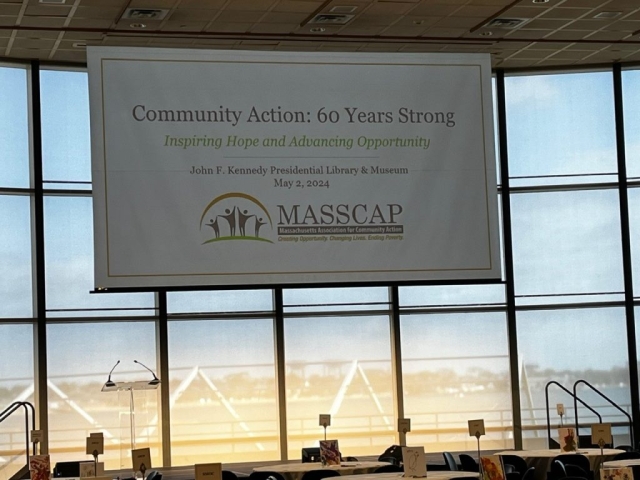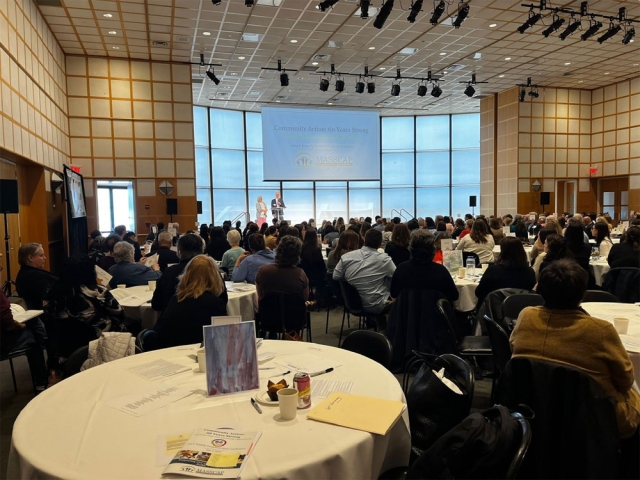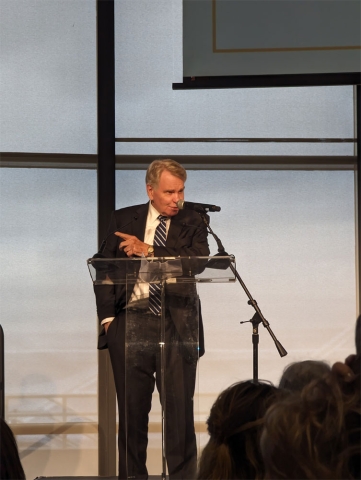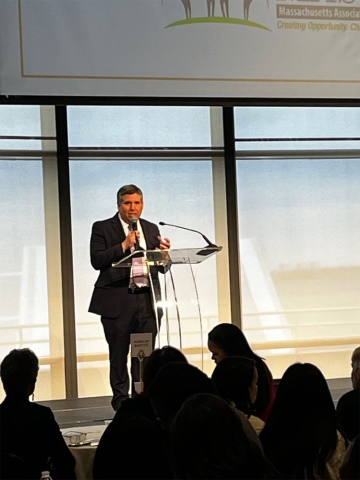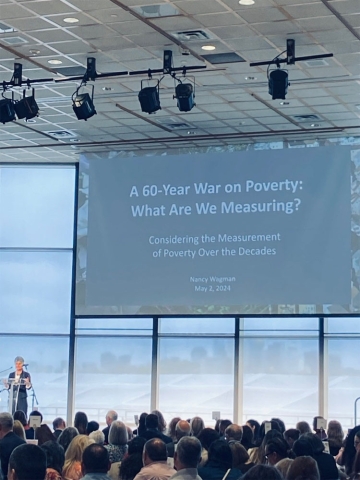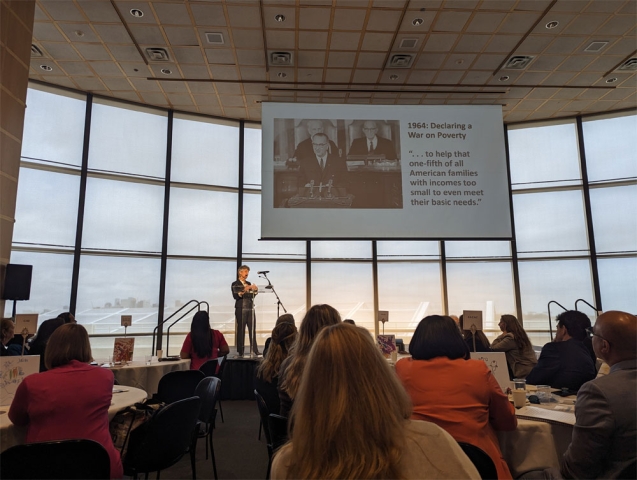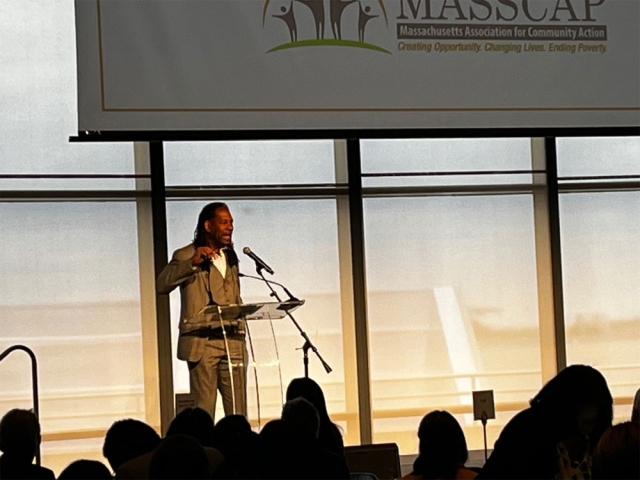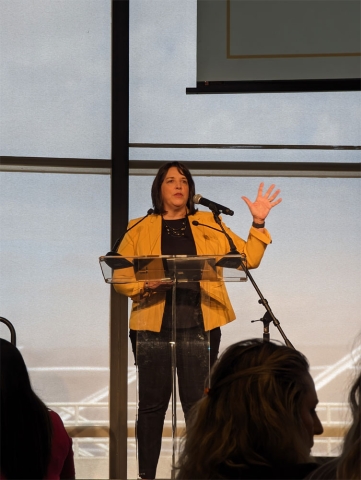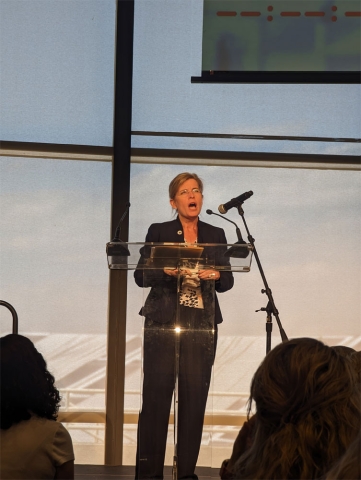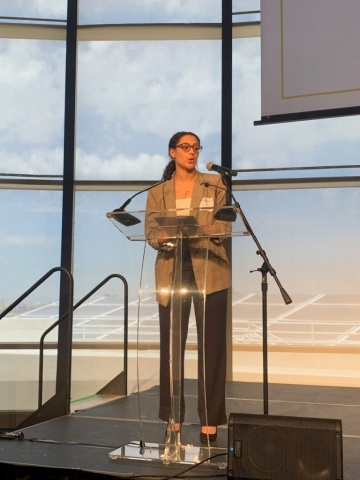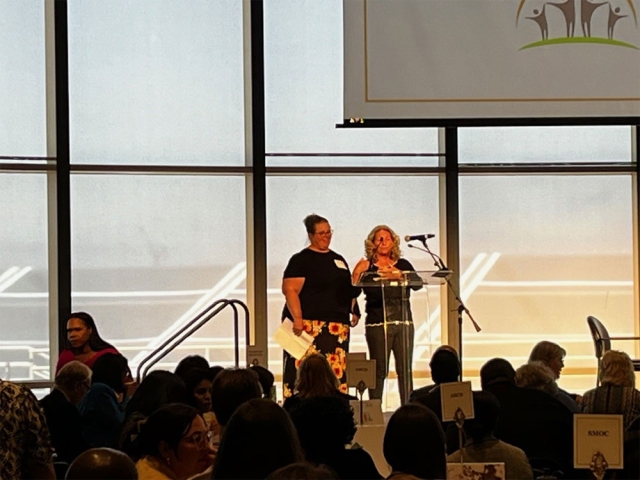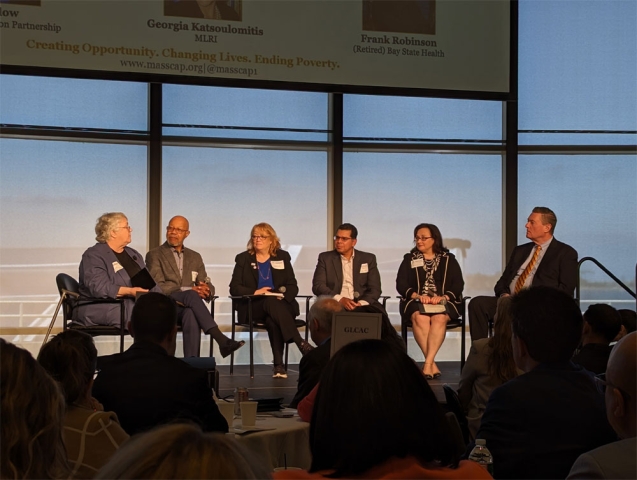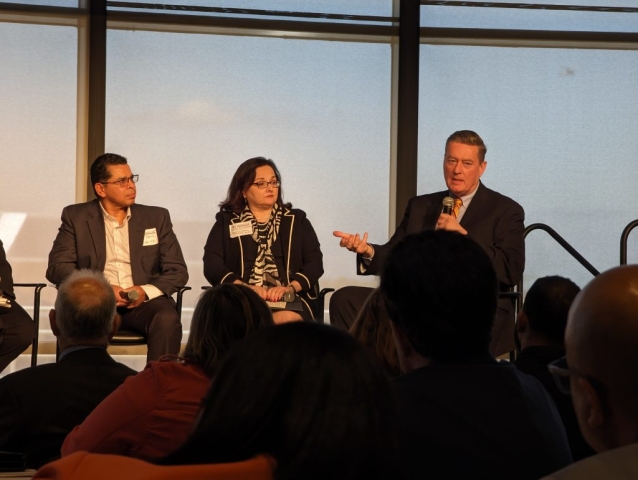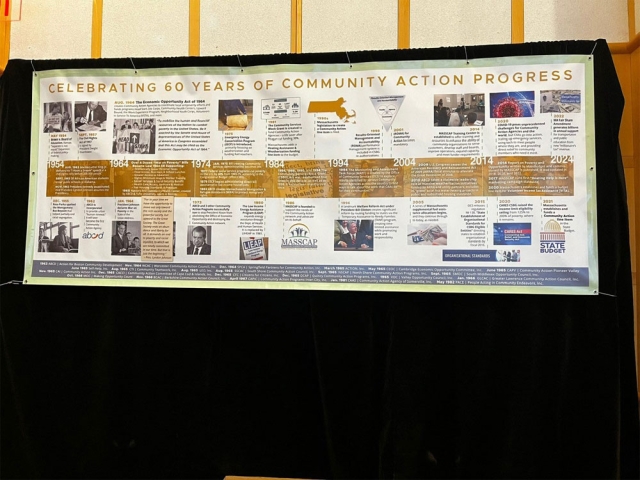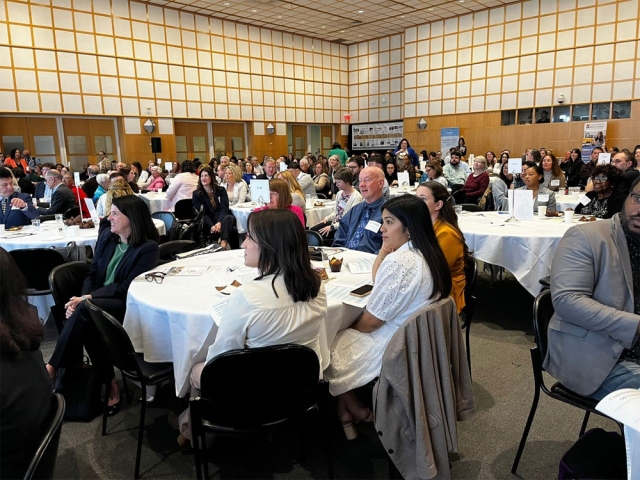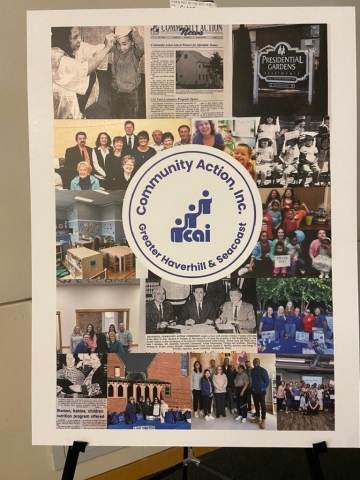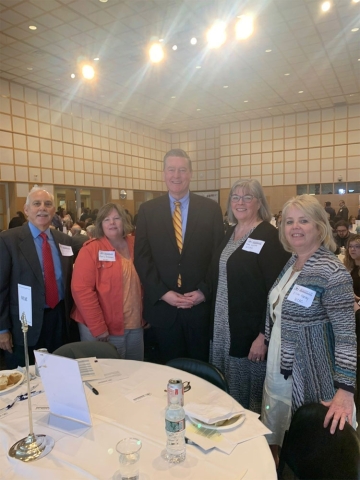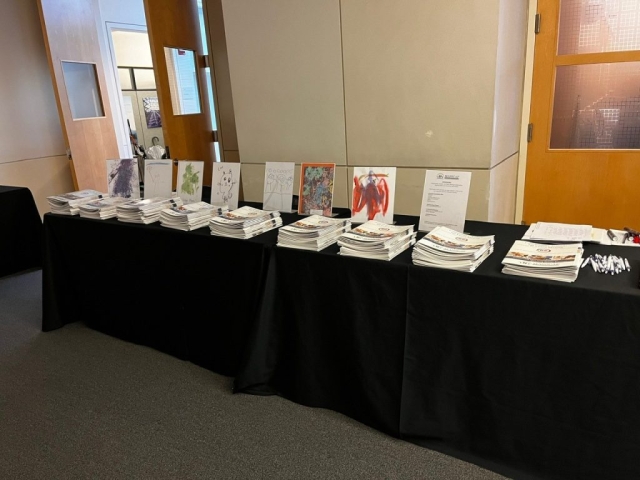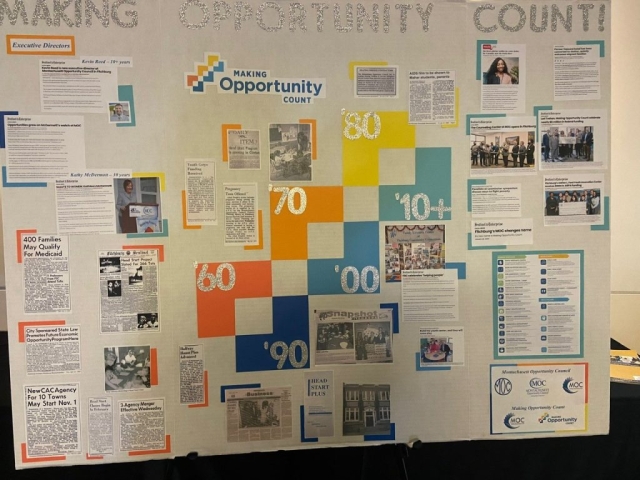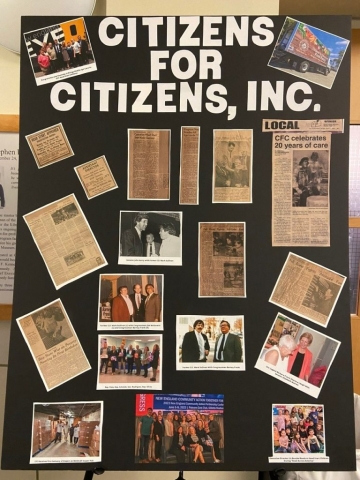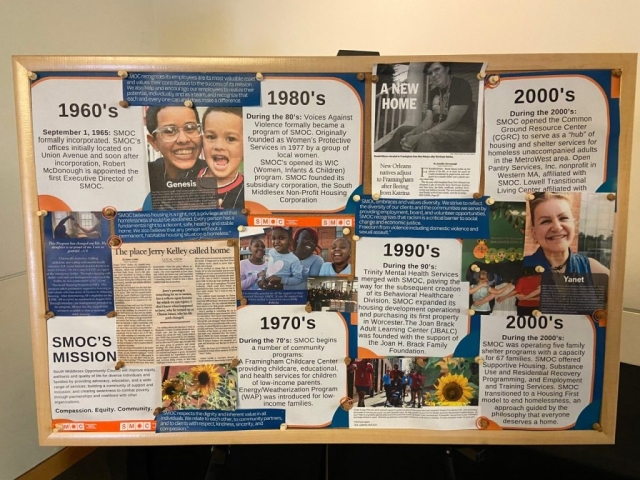Inspiring Hope and Advancing Opportunity
Smith Hall, John F. Kennedy Presidential Library and Museum
On May 2, 2024, MASSCAP together with leadership and staff from all 23 Community Action Agencies in Massachusetts as well as allied organizations and partners and clients gathered not only to celebrate 60 years of Community Action, but also to reflect on where we are today and how to move forward in continuing to change lives, create opportunity and advance racial, social and economic justice.
“Over the last 60 years, we have met the challenges of low-income people, helping them to rise out of poverty, provide for their families and be engaged with their communities. Today is a day we can build on the success and lessons of the last 60 years so that we can get closer and close to that ideal of ending poverty in the United States,” Laura Meisenhelter, MASSCAP President and Executive Director, North Shore Community Action Program (NSCAP) told us. Laura talked about how Community Action respects “the inherent dignity of each person” in everything we do and how important that is.
We heard from David Bradley, Chief Executive Officer and Co-Founder, National Community Action Foundation, on the history of Community Action. Community Action Agencies were founded as part of the Economic Opportunity Act in 1964 during the “war on poverty”. Learn more about our history.
We examined the Poverty Measure, how it came to be and what it means now with presentation from Nancy Wagman, Policy Consultant. We can clearly see that the poverty line has not kept up with the increasing standard of living.
Our featured speaker Elzie “LZ” Granderson, OpEd Columnist, LA Times, ABC News Contributor, Life Out loud w/LZ Granderson podcast, inspired us to be intentional with everything that we do, to always talk to those who are different than you, to find the similarities, to shift from thinking about helping “them” and see ourselves as servants and most of all to create a space where we offer each other more grace.
We were joined by our legislative partners, Senator Sal DiDomenico and Representative Marjorie Decker, who are chairing a newly empaneled commission on poverty and opportunity tasked with examining where we are now and make recommendations for reducing poverty and advancing opportunity for all. This commission is working to bring a blueprint to the Commonwealth including practical recommendations about how to fight poverty and create more opportunity. As Senator DiDomenico reminded us, “We will be remembered for how we support others, how we helped our communities. If not you, then who?”
We used our lunch time to consider real client scenarios that agencies shared to talk about how we better serve our communities. We heard from a mother and daughter team that benefited from Head Start and other programs at PACE in New Bedford about the impact on their lives and how they give back now.
Patti, previous Head Start parent, Head Start teacher and volunteer at PACE in New Bedford, told us that Head Start is here her life literally began. “My daughter’s teachers invited me to volunteer in the classroom, and I loved what was happening. They encouraged me to further my career. I took my first college course with their assistance. I ended up continuing. I became a Assistant Teacher in a preschool classroom. I went from Assistant Teacher to Teacher. I went from Teacher to Director…I owe it all to Head Start.” Patti implored us, “Please don’t stop doing what you are doing. You have no idea how you affect families, children…I have parents that call me today, twenty years later, saying thank you so much because they realize (just like my daughter) I can do more, the world is bigger than my little neighborhood.”
Alicia, Patti’s daughter, is now Assistant Finance Director at PACE after putting her own daughter in Head Start and volunteering. A volunteer position as treasurer of the Head Start policy council caused her to pursue her education and career in finance. “Thank you for all that you do in this field for assisting the folks who need it and thank you for helping me become who I am today,” Alicia told us.
We had a lively panel discussion about the way forward including Clare Higgins, Executive Director, Community Action Pioneer Valley (moderator), Edward M. Augustus, Secretary, MA Executive Office of Housing and Livable Communities, Juan Bonilla, Vice President of Economic Inclusion and Wealth Building, United Way of Massachusetts Bay, Denise Harlow. Chief Executive Officer, National Community Action Partnership, Georgia Katsoulomitis, Executive Director, Massachusetts Law Reform Institute, and Frank Robinson, Former Vice President of Public Health, Bay State Health. The panel discussed policy, program and practice including what we know works and poverty being a policy choice, the need for stable and affordable housing, the whole family approach, investing in children, changing the “lesser than” narrative, and changing the national narrative think of poverty as a morale wrong that is unacceptable, and how we can work together to fight for justice. Listen to the panel discussion here.
Key Takeways
- We must ensure that all voices are heard. We must all vote.
- We must look at our similarities not our differences.
- Poverty is a function of unfortunate circumstances (and low wage work!). It is not a moral failing. We must shift the “lesser than” narrative thinking about what it means to be human – getting help is ok!
- We must offer each other more grace and love.
- We need responsible innovation to make actual change and reimagine the work.
- Big organizations must come together to take action in their own communities.
- We must draw on what we have learned about human needs and our experience in what works to continue the progress.
- We must invest in programs and policies that move people out of poverty.
- We can do more!
“Today for the first time in all the history of the human race, a great nation is able to make and is willing to make a commitment to eradicate poverty among its people. We will work with them through our communities all over the country to develop comprehensive community action programs – with remedial education, with job training, with retraining, with health and employment counseling, with neighborhood improvement. We will strike at poverty’s roots.”
– President Lyndon Johnson, August 20, 1964 (signing of the Economic Opportunity Act)

